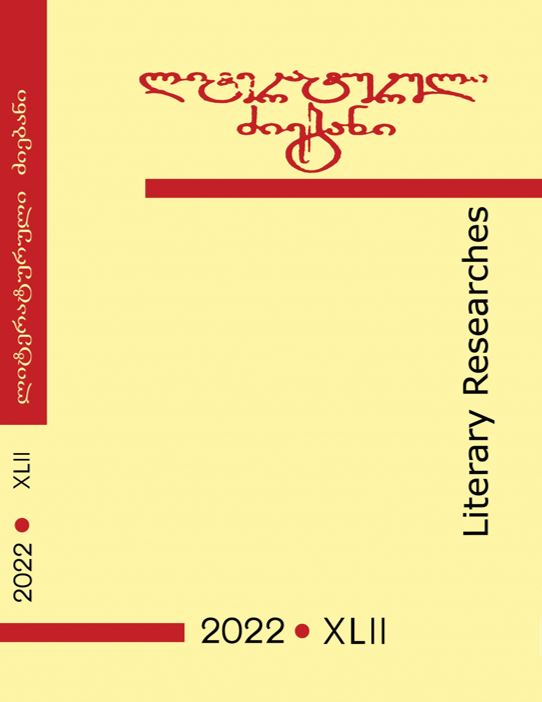ფსევდოევროპული დისკურსი და დეპერსონალიზაციის საკითხი აჰმედ ჰამდი თანფინარის რომანში „დროის მარეგულირებელი ინსტიტუტი “
გამოქვეყნებული 2022-04-30
საკვანძო სიტყვები
- თურქული ლიტერატურა,
- ფსევდოევროპული ნარატივი,
- ცივილიზაციათა კონფლიქტი,
- აჰმედ ჰამდი თანფინარი,
- რომანი „დროის მარეგულირებელი ინსტიტუტი “
როგორ უნდა ციტირება
ანოტაცია
The basis of the new Turkish literature is crisis of civilization. The mentioned critical situation was conditioned by the historical, political-economic and social factors. For the purpose of maintaining territorial integrity, state governance, the Ottoman intellectuals had to seek the “way to safety” in the Europe. Fermani (Edict), declared in 1839, by Mustafa Reshid Pasha in Gulhane Park, known also as Tanzimat Fermani was official declaration of the pro-European course. Attempt of establishing of the European concept turned out to be doomed from the outset, as it was based on the superficial views about the bases of the European civilization. The mentioned narrative has not prepared the public opinion for meeting with the Europe and for the actual traumas. Attempt of building of the European civilization on the fragile basis resulted in formation of two public life styles – alaturca and alafranga. Dualism revealed in all spheres of public life. In Turkish literature, such ambivalence has its relevant name, it is called “pseudo-Europeanization” or “false Europeanization”. The writers, representatives of the first generation of Tanzimat literature attempted to fully liberate Turkish literature from the influence of oriental literature and place it within the framework of the western literary traditions. And in this process, the most significant is changing of the system of thought and this
has conditioned the “unhealthy” European discourse. In the pseudo-European narrative, sensitivity to the system of values and identity crisis were placed on the first plane. Ahmed HamdiTanpinar demonstrates distortion of the social consciousness, destruction of the moral categories on the example of the life of the novel’s main protagonist. “Maybe what we call the person, is nothing else but synthesis of the accidentally acquired masks that we store in the chest of our memory?” This question bothers Hayri Irdal, protagonist of the novel “The Time Regulation Institute” by famous Turkish writer of 20th century Ahmet Hamdi Tanpinar. He is somewhere between the “traditional time” and “new time” and cannot make choice in favor of one of them. Modernization process commenced in 1839 in Ottoman Empire became the basis for dividing of Turkish society into two parts. New thinking forms, differentiation of the orientation of the values, secularization and pluralizing of the public knowledge and education, diversity of ideological directions and self-identification of a person became the significant strategies that have formed two styles of life and thinking: alaturca and alafranga. In Turkish literature the issue of leveling of individual thinking, free activity of a person arose in full clarity. Ahmet Hamdi Tanpinar, in his novel “The Time Regulation Institute”, creates the model of society fed with the pseudo values, where there is described the drama of the person “once thrown” into the world. The process of protagonist’s degradation is placed into the frame of parody and absurdity. It is hard for Hayri Irdal to identify himself as part of any specific group of the society. He is stranger in his family, at his job, with his friends. In case of the character, drastic change of sociocultural environment results in de-personalization. People living in unreal time and space, successfully demonstrate pseudo-happiness by arranging various festivities. For Hayri Irdal, lost in the illusive and utopic world model, kindness, dignity, national identity is determined in his teacher, Nuri Efendi, clock repairman, which has assembled him like the “rusty clock” and attempted to adapt him to the real world. At the initial stage of his life, sense of freedom in Hayri Irdal is all-embracing and he cares about it like “gold bar”. Though, at the following stage of his life, after fighting with himself, the consumer’s nature made him a conformist and he made choice in favor of living in abundance in the magic world of the falsehood. Hayri Irdal is some kind of “polyphonic character”, which listens, of numerous voices in his soul, to the one requiring from him sacrificing of his soul instead of material wealth.

